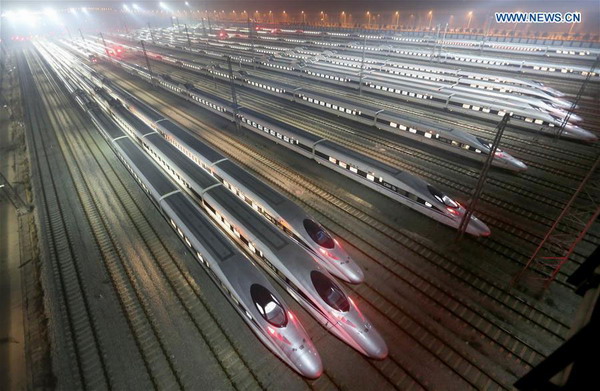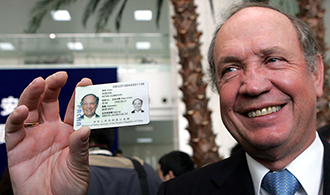Better let market forces decide if high-speed trains offer WiFi
(China Daily) Updated: 2016-03-09 08:13
 |
|
File photo taken on Dec 25, 2012 shows bullet trains which will put into operation on the Beijing-Guangzhou high-speed railway, at a highway-speed train base in Wuhan, capital of Central China's Hubei province. [Photo/Xinhua] |
WANG MENGSHU, an expert at the Chinese Academy of Engineering, said at a panel discussion on the sidelines of the current annual session of the National People's Congress that WiFi should not be provided on high-speed trains, as it might disturb onboard communication signals and would also cost a lot in maintenance. He also encouraged passengers to enjoy the views, instead of fixing their eyes on the tiny screens of smartphones and laptops. However, on Tuesday Beijing Youth Daily said it should be market demand that decides whether the WiFi is offered on board trains or not:
An increasing number of residents, especially young white collar workers, are addicted to their smartphones rather than face-to-face interactions, thanks to the extensive WiFi coverage across the country. That partly justifies Wang's opposition to the offering of WiFi on high-speed trains, because they are not supposed to be dependent on high-tech gadgets.
It is also evident that passengers on trains without free WiFi will use their smartphones and other mobile devices less.
However, whether the trains should provide a free WiFi service fundamentally depends on customer demand.
In other words, State-owned as it is, the China Railway Corp still has to abide by relevant market rules, and provide technologically feasible services to passengers if that is what they want. It cannot turn a blind eye to customers' wants "for the sake of their well-being".
Free WiFi, in fact, is already available on a slew of buses and coaches. This is a natural response to their competition with trains (especially high-speed ones), which are significantly faster and safer. The bus companies have been compelled to improve their services to survive.
It requires properly tailored guidance, not a total ban on the use, to offset the negative effects of high-end technologies, such as people's increasing addiction to smartphones.
For the time being, it is impossible that free WiFi be offered on all high-speed trains. But the demand for it will continue to grow, thus the CRC should refrain from maneuvering the market's choice.











